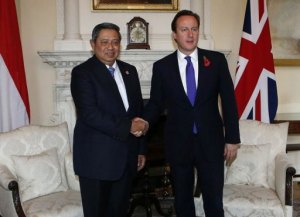As with many areas in Indonesia and around the world, people in Papua move from rural areas to the city. However, having lived close to their land for thousands of years their competitive streak in setting up small businesses lags behind that of migrants who have for generations had the skills to run businesses, according to Rio Pangemanan, Oxfam program manager on the Papua Enterprise Development Program.
In no corner of the town of Wamena will one see a shop that is owned or run by indigenous Papuans. Indigenous women with their noken (traditional Papuan woven bags) hanging from their heads to their backs sell sweet potatoes or vegetables on a cloth in the street markets. Young strong-limbed Papuan men push rickshaws, some even in bare feet. Others wander around the markets, intoxicated from glue-sniffing.
The UK based international development organization Oxfam is the international NGO that is allowed to operate in the province. Working with local partners, Oxfam has been supporting local farmers in five regencies in Papua in developing their farms and markets.
Oxfam supports the farmers according to the local needs and potential. For example, in Yapen Island, Oxfam has supported the Wamanuam Be Kitabono Yawa (WMY) Cooperative in cultivating vanilla beans. In Jayawijaya regency, the NGO has supported the Independent Business Foundation (Yapum) in cultivating and distributing sweet potatoes. Meanwhile in Paniai and Nabire Oxfam has supported their local partners in helping coffee farmers and in Jayapura, cacao farmers.
Oxfam’s contract ends next year, but Rio hopes that the NGO will get an extension for its programs. Rio said of the vanilla program in Serui that vanilla vines needed three years to produce beans, so new farmers would only have their first harvest in 2014. Rio said that by the end of 2014, he hoped the cooperative would be able to run independently.
Meanwhile in Wamena, Rio estimates that it will take two years for their partners to be independent in terms of management. He said that if the local government could take part in transportation and distribution of the produce, Oxfam’s partners, such as Yapum, would be able to operate independently once their management capacity had been strengthened.
In his office in Serui, Apolos Mora, the head of WMY cooperative said that for years vanilla trees grew in the wild in forests in Yapen. The Dutch brought the seeds when they opened coffee and chocolate farms on the island in the 1950s. “Before they [the Dutch] could teach the local people to cultivate vanilla, there was the transfer of power to Indonesia,” Apolos said.
One day in 2008, Apolos was reading about vanilla in the bookstore and an “Aha!” moment hit him as he realized that these plants were the ones that grew wild in the forest. When Madagascar, the largest vanilla pod producer in the world, had poor harvests, the price of vanilla pods skyrocketed to Rp 3 million (US$309) per kilogram, Apolos said. Apolos then decided to cultivate vanilla vines and trained the farmers joining his cooperative to plant vanilla too. He sells the pods to Manado, where they are exported to Europe, the US, Australia and New Zealand. Recently, the price for dried vanilla pods was Rp 115,000 per kilogram.
PEDP manager, Rio Pangemanan, said that Oxfam supported programs according to the characteristics of the area. The island and coastal areas are more developed than the mountain areas due to ease of access to other islands in Indonesia. The mountain areas meanwhile are more isolated. This results in a different variety of crops that can be profitable to produce. While farmers in Serui can sell their crops in Manado, in Wamena farmers can only sell locally.
In Jayawijaya, Oxfam supports farmers revitalizing their sweet potato farms. Partnering with Yapum, they have developed 20 sweet potato collecting points in Jayawijaya that will distribute the crops to the markets in Wamena. Rio said that these collecting points had become a place for farmer’s advocacy and education to motivate the community to return to their farms instead of leaving for the city.
Local NGOs such as Yapum and WMY cooperative say that it is not always easy advocating for farmers to cultivate vanilla beans or sweet potatoes. Farmers’ programs in Papua are often project-based, in which farmers are given money to open rice paddies or fishponds. Once the funds dry up, the projects become neglected.
Eli Tabuni, the secretary of one of the sweet potato collecting points was one of the farmers who questioned the program. “This [sweet potato farming] is our culture, why are you making a project out of this?” he asked Yapum and Oxfam during their visit there. He said that many of the programs were only temporary and were not really helpful.
Kiloner Wenda, Oxfam Sweet Potato project officer in Jayawijaya, answered Eli in the Lani language with another question. “Where are the young people now who will work on the farms?” he said. “If we don’t start now, then our culture will slowly disappear,” he said.
Rio said that the projects aimed to support indigenous Papuan farmers in developing their business sense and opening their access to markets. In Wamena, women carrying their sweet potatoes from their villages to the market have to pay for transportation to the market for their heavy bags.
Yapum encourages them to sell the potatoes for Rp 5,000 per kilogram, and they only need to drop their crops at the collecting points. This way, the women did not have to travel far to the markets and could save on transportation, Rio said.
In Serui, the program has managed to attract young farmers, but in Wamena, whether the program will succeed in bringing the young back to the farms is yet to be seen. For the kids that like to play in the farm, their dreams are to be pilots and teachers, they say. But they will always love eating sweet potatoes.
Source: The Jakarta Post












